If one was of a cynical nature – and we’d never dream of lowering the tone of publication as wholesome as ICL – the opinion might be put forward that it is fitting that the GAA has its 2022 schedule sorted while the 2021 programme remains in flux.
Obviously, a global pandemic is playing a sizeable part in the uncertainty that continues to prevail and hopefully we will have a solution soon. Given that the window in which Gaelic games can be played this year is narrowing with every announcement, the national leagues look more and more like a non-runner and the notion of holding over the inter-county season until after club championships has a lot of logic to it.
Ideally, that would mean inter-county games would be taking place at a time when supporters can safely attend again – but we were expressing similar sentiments last year, so nothing can be taken for granted.
Regardless of what happens for the rest of this year, it looks as if next year will be the start of the new way of doing things for the association, following ratification at the 2021 annual Congress, which was held virtually.
New schedule
One of the few positive developments to come from the Covid-19-hit 2020 season was the decision to compartmentalise the inter-county and club seasons and Congress rubber-stamped such a move as the way forward, with the 29th Sunday of the year set as the deadline for the All-Ireland finals (30th Sunday if January 1 is a Sunday).
For those without calendars to hand, that weekend falls in mid-July, allowing for club championships to then proceed from the beginning of August.
There will be those who lament on the one hand that the first and third Sundays in September will no longer be the special occasions they used to be and also those who will proclaim it a travesty there is no club championship action May, June and July. They’re right, to a degree – but the circle can’t be squared, not with the level of preparation involved at inter-county level and the demand for players not to play with their clubs in the fortnight before a county game.
Combining the two had become unworkable, like two climber plants in the same glasshouse that had curled around each other. In such a situation, the only solution is to cut them back and brace them so that they stay apart.
Having segregated championship seasons may not be a perfect way to go, but it is realistically better than any alternative. While it is the elite minority that generate the greatest chunk of the GAA’s income, the silent majority of club players makes up about 97% of the playing population.
For far too long, players on club teams have been back in training in December or January, with a tunnel-vision focus on a first-round game in April or May before then going back into hibernation until their county team is eliminated from the All-Ireland series.
June and July had effectively become closed off for club championship games, so making such a situation official doesn’t really result in much being lost for the club players, who can now plan holidays without the fear that plans will have to change at the last minute.
Technically, this calendar change is now in effect, but with the proviso that the GAA’s Central Council can make alterations in exceptional circumstances, which will obviously be the case for 2021.
Black card
A noticeable change we are likely to see this year is on the field, come with the passing of a rule-change that will see greater punishments for cynical fouls in hurling. Ever since the introduction of the black card in football, there has been a defensiveness among a certain sector of hurling people, staunchly denying that their fair sport should ever need such a punishment.
But here’s the thing – if they are right and there is no cynicism in hurling, then the black card will remain in the referee’s pocket, never to be needed. It’s the same as the country having severe penalties for serious crimes, though the vast majority of us never need to worry about that as we don’t commit such crimes.
While some of the opposition to the change is wrapped up in false concern for match officials, there isn’t really any extra burden on the referees in determining whether a foul is cynical – you mightn’t be able to perfectly define such play, but you know it when you see it.
One area of concern is the possibility that an attacker might have an incentive to con the referee and, if fair is fair, the instances of over-carrying should be more rigorously monitored. After all, if it’s cynical for a defender to haul down an attacker who’s clear on goal, isn’t it just as cynical to keep the ball in your hand when you know you’ve taken four steps?
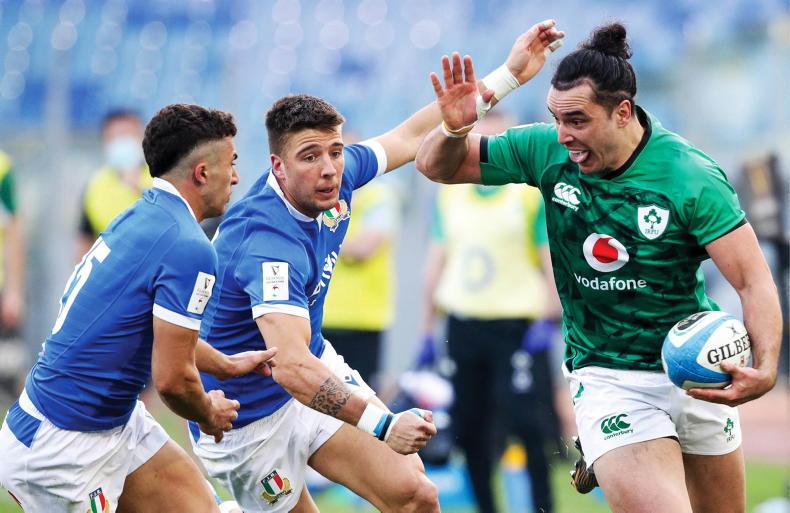
James Lowe on the attack during Ireland’s 48-10 win over Italy in Rome. \ Sportsfile
Back on the right road after romp in Rome
Without wishing to offend any Italian readers, defeat for Ireland in Rome on Saturday would have represented rock-bottom but, thankfully, a repeat of 2013 was avoided and Andy Farrell’s men belatedly got off the mark for 2021.
There is a large caveat in terms of the opposition but the Irish performance did look to have more zip to it than in the losses to Wales and France, with offloads more prominent than before.
The road to recovery was going to have to start with baby-steps, and a two-week lead-in to the clash with Scotland should help preparations in that regard, but judgement on the extent of Ireland’s improvement will naturally be reserved until after the game in Murrayfield next weekend.
In the meantime, Wales – almost written off before the tournament started and nearly beaten by 14-man Ireland – only need to overcome Italy in order to head to Paris with a Grand Slam on the line. Funny old game, eh?
If one was of a cynical nature – and we’d never dream of lowering the tone of publication as wholesome as ICL – the opinion might be put forward that it is fitting that the GAA has its 2022 schedule sorted while the 2021 programme remains in flux.
Obviously, a global pandemic is playing a sizeable part in the uncertainty that continues to prevail and hopefully we will have a solution soon. Given that the window in which Gaelic games can be played this year is narrowing with every announcement, the national leagues look more and more like a non-runner and the notion of holding over the inter-county season until after club championships has a lot of logic to it.
Ideally, that would mean inter-county games would be taking place at a time when supporters can safely attend again – but we were expressing similar sentiments last year, so nothing can be taken for granted.
Regardless of what happens for the rest of this year, it looks as if next year will be the start of the new way of doing things for the association, following ratification at the 2021 annual Congress, which was held virtually.
New schedule
One of the few positive developments to come from the Covid-19-hit 2020 season was the decision to compartmentalise the inter-county and club seasons and Congress rubber-stamped such a move as the way forward, with the 29th Sunday of the year set as the deadline for the All-Ireland finals (30th Sunday if January 1 is a Sunday).
For those without calendars to hand, that weekend falls in mid-July, allowing for club championships to then proceed from the beginning of August.
There will be those who lament on the one hand that the first and third Sundays in September will no longer be the special occasions they used to be and also those who will proclaim it a travesty there is no club championship action May, June and July. They’re right, to a degree – but the circle can’t be squared, not with the level of preparation involved at inter-county level and the demand for players not to play with their clubs in the fortnight before a county game.
Combining the two had become unworkable, like two climber plants in the same glasshouse that had curled around each other. In such a situation, the only solution is to cut them back and brace them so that they stay apart.
Having segregated championship seasons may not be a perfect way to go, but it is realistically better than any alternative. While it is the elite minority that generate the greatest chunk of the GAA’s income, the silent majority of club players makes up about 97% of the playing population.
For far too long, players on club teams have been back in training in December or January, with a tunnel-vision focus on a first-round game in April or May before then going back into hibernation until their county team is eliminated from the All-Ireland series.
June and July had effectively become closed off for club championship games, so making such a situation official doesn’t really result in much being lost for the club players, who can now plan holidays without the fear that plans will have to change at the last minute.
Technically, this calendar change is now in effect, but with the proviso that the GAA’s Central Council can make alterations in exceptional circumstances, which will obviously be the case for 2021.
Black card
A noticeable change we are likely to see this year is on the field, come with the passing of a rule-change that will see greater punishments for cynical fouls in hurling. Ever since the introduction of the black card in football, there has been a defensiveness among a certain sector of hurling people, staunchly denying that their fair sport should ever need such a punishment.
But here’s the thing – if they are right and there is no cynicism in hurling, then the black card will remain in the referee’s pocket, never to be needed. It’s the same as the country having severe penalties for serious crimes, though the vast majority of us never need to worry about that as we don’t commit such crimes.
While some of the opposition to the change is wrapped up in false concern for match officials, there isn’t really any extra burden on the referees in determining whether a foul is cynical – you mightn’t be able to perfectly define such play, but you know it when you see it.
One area of concern is the possibility that an attacker might have an incentive to con the referee and, if fair is fair, the instances of over-carrying should be more rigorously monitored. After all, if it’s cynical for a defender to haul down an attacker who’s clear on goal, isn’t it just as cynical to keep the ball in your hand when you know you’ve taken four steps?

James Lowe on the attack during Ireland’s 48-10 win over Italy in Rome. \ Sportsfile
Back on the right road after romp in Rome
Without wishing to offend any Italian readers, defeat for Ireland in Rome on Saturday would have represented rock-bottom but, thankfully, a repeat of 2013 was avoided and Andy Farrell’s men belatedly got off the mark for 2021.
There is a large caveat in terms of the opposition but the Irish performance did look to have more zip to it than in the losses to Wales and France, with offloads more prominent than before.
The road to recovery was going to have to start with baby-steps, and a two-week lead-in to the clash with Scotland should help preparations in that regard, but judgement on the extent of Ireland’s improvement will naturally be reserved until after the game in Murrayfield next weekend.
In the meantime, Wales – almost written off before the tournament started and nearly beaten by 14-man Ireland – only need to overcome Italy in order to head to Paris with a Grand Slam on the line. Funny old game, eh?





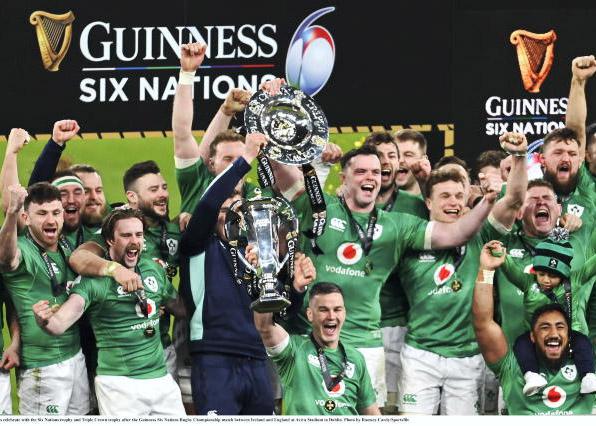

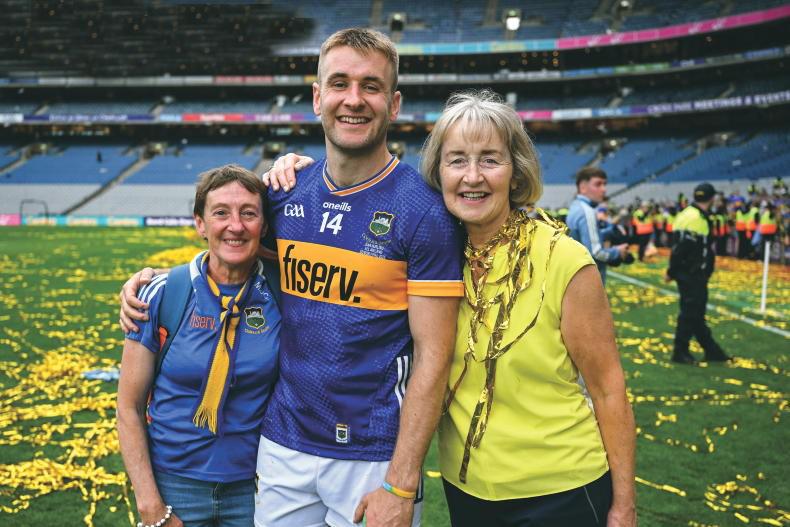
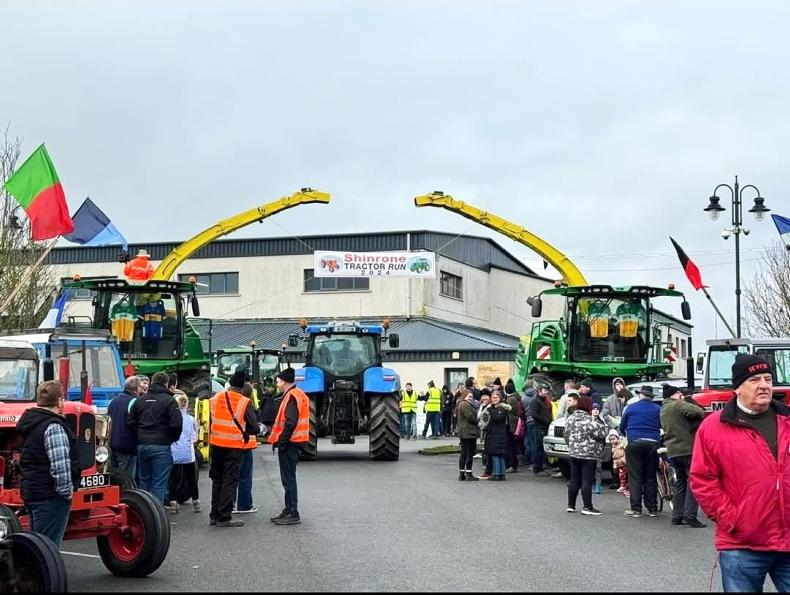
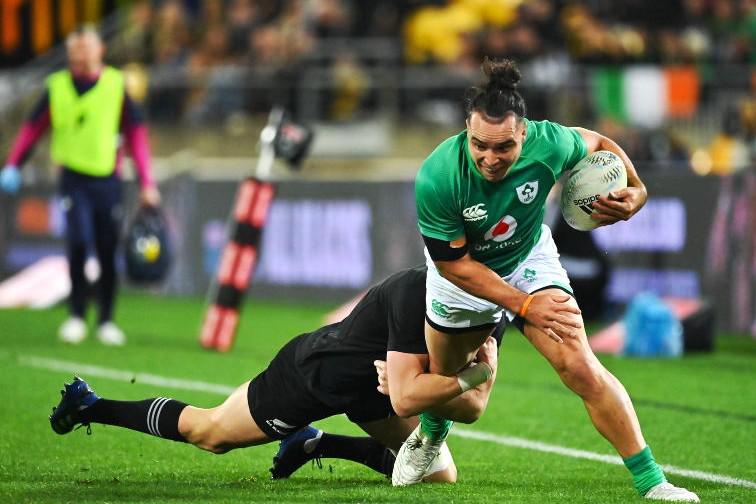
SHARING OPTIONS